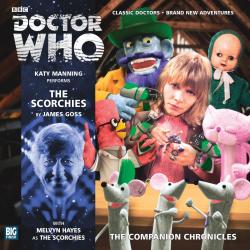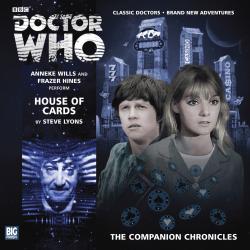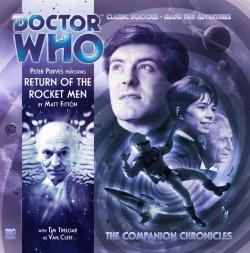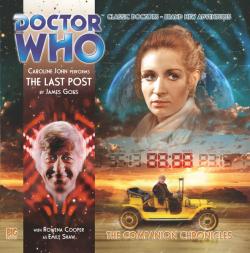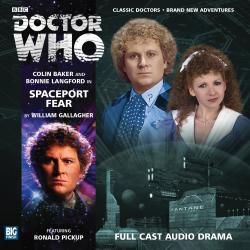War Against the Laan (Big Finish)
Friday, 5 April 2013 - Reviewed by Matt Hills
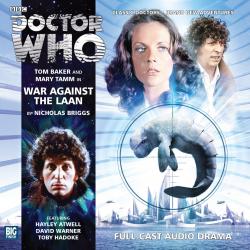
War Against the Laan
Big Finish Productions
Written by Nicholas Briggs
Directed by: Nicholas Briggs
Released March 2013
Following on directly from The Sands of Life and its cliffhanger, this two part story continues the Conglomerate’s scheming, as led by their CEO Cuthbert (David Warner). Warner revels in his megalomaniacal role, with Cuthbert buying whatever scientific expertise he needs while going head-to-head against the Doctor and testing the mettle of Earth’s newly elected President, Sheridan Moorkurk (Hayley Atwell).
The Sands of Life configured an intriguing dilemma: respecting the Laan’s life cycle could mean all of humanity facing extinction. War Against the Laan picks up this puzzle, but the titular struggle is not one readily engaged in by the Doctor and Romana. Unlike the ruthless Cuthbert, our heroes are instead seeking a peaceful way to resolve the situation; it’s jaw-jaw not war-war for this TARDIS team, especially given that the scenario they’re up against is not at all an archetypal ‘invasion’.
Nick Briggs’ script gives both Warner and Atwell more to do this time round, and Tom Baker lavishes actorly attention on a number of his anti-Cuthbert expostulations, as well as sneaking a mention of badgers into his performance (I refuse to believe that moment was penned by Briggs, unless and until I see evidence to the contrary!). K-9 basically vanishes from proceedings – having not been well utilized in this adventure – and Cuthbert also disappears at the very end, leaving the President to tie up a few (but not all) loose ends and bid the Doctor and Romana adieu. A closing scene between the Doctor and Cuthbert would have been more dramatically satisfying and less conventional, but this possibility is instead displaced by a slightly run-of-the-mill goodbye scene.
Combined with The Sands of Life, War Against the Laan ends up feeling like a strangely cosy four-parter despite some of its hard-hitting subject matter. It resists emulating the new series or “doing a Moffat” and shifting its second half to a wholly different time zone, setting or subgenre, and even finds time to revisit Genesis of the Daleks again, after its dialogue had already been referenced in the preceding release. I felt slightly let down by the resolution of the Laan conundrum, though. Having defined a brilliant, epic problem for the fourth Doctor and Romana to tackle, one with a real emotional and moral kick to it, things are clarified here until the main issue is pretty much sandpapered way. Tough questions are posed; easier answers are supplied. Likewise, a scientist whose services are bought and paid for by Cuthbert is called upon to wield his “auto dissect tools” on a child-bearing Laan, and although the emotional darkness of this is gestured at, any moral grey areas are fairly rapidly done away with. War Against the Laan tends to retreat into pulp fiction certainties or dodges, despite depicting a complex world of real politik and rampant commercialism.
There’s a mystery left dangling: Cuthbert’s thwarted experiment in the Proxima Four System evidently concerns some sort of time-space manipulation, but beyond that we learn little of the specifics. Presumably this will be returned to later in the current run of fourth Doctor tales, though the villain who wants time travel is itself a fairly well-worn Who theme. Perhaps Cuthbert wants total brand domination across all temporalities as well as all territories… less the Master, and more the evil Merchandiser. If so, Cuthbert’s moment as a zeitgeist baddie may well have arrived; initially an Audio Visuals’ creation of the Thatcher years, it is striking that he's been reimagined both as Doctor Who itself enters a peak of (anniversary) commercial activity, and as the UK simultaneously faces a resurgence in free market rhetoric and privatization. It seems fitting that the fourth Doctor's contemporary Moriarty figure should be a corporate celebrity, operating outside the law and above the government.
The Laan are also an interesting creation, pregnant with possibilities, and represented almost as a kind of time-vortex salmon (though they’re actually described and visualized as giant seacows) instinctively returning to a particular space-time to spawn. I realize their massification is part of the story’s bid for scope and scale, but I still would have liked a greater sense of Laan culture or individuation. There are implications and hints – they refer to “sisters”, and there are “elders” who lead the birthing – but when Romana communicates empathetically with them we don’t get much in the way of Laan personality, quirks or differences. Instead, they seem to be a resolute collective; a big society of seven billion or so.
War Against the Laan does an excellent job of building Cuthbert's villainy and character, as well as seeding plot points which are sure to return. As a complete story alongside its predecessor, however, it promises more than it quite delivers. But there's real storytelling ambition on show here, and I'm already looking forward to Cuthbert's reappearance, not to mention the next full-on performance skirmish between David Warner and Tom Baker.
